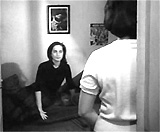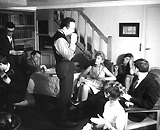
|
Paris Belongs to Us (1961, Fr.)
(aka Paris Nous Appartient)
In Jacques Rivette's low-budget, French New Wave debut
film - a frustrating, dark, doom-laden, psychological thriller-mystery
set in 1957 Paris:
- the film's opening contradictory epigraph: "Paris
Belongs to No One" from a poem by Charles Péguy, and
the camera's blurry train trip (shot through the train window)
through Paris, ultimately arriving at the apartment of college
literature student-ingenue Anne Goupil (Betty Schneider) reading The
Tempest; she heard the grieving and sobbing of a Spanish female
neighbor who knew her older brother Pierre Goupil (François
Maistre) (and falsely claimed he was dead!); she spoke about the
death (or suicide?) of an unseen character named Juan
- young innocent heroine Anne with her brother Pierre
attended a Left Bank party scene of a diverse group of youthful,
self-deluding, troubled bohemian idealists; the party was hosted
by struggling and tortured theatre director Gerard Lenz (Giani Esposito),
the current boyfriend of Terry Yordan (Françoise Prévost);
she was the film's pivotal character - she was a political exile
from the US, and also the mysterious femme fatale ex-wife
of expatriate American and boozy, angry and neurotic Pulitzer Prize-winning
writer Philip Kaufman (Daniel Crohem) who was escaping blacklisting
McCarthyism
- the main subject of party conversation was the mysterious
and suspicious death of Juan (a strong-willed anti-Franco Spanish
political activist, avante-garde guitarist and Terry's ex-boyfriend),
and the possible intriguing and fearful notion of the existence of
a secret worldwide organization involved in conspiracy and political
assassination, including Juan as a victim: ("Everything's threatened
- the world. And nothing can be done"); however, Terry claimed
that her breakup with Juan was the cause of his suicide, not conspiracy;
it was suspected, according to Philip, that Gerard would be the organization's
next victim
- a play-within-a film - director Gerard's rehearsal
of Shakespeare's play Pericles, Prince of Tyre, and the choice
of Anne to play the role of Marina in the off-beat, no-budget, bare-bones,
left-wing summer production
- Anne's elusive and intriguing detective-like quest
for the truth about Juan's death, and for the dead Spaniard's legendary
last musical guitar recording before his death, to be used as part
of the soundtrack for Gerard's play
- the sequence of a bizarre sidewalk cafe cameo appearance
by Jean-Luc Godard (as Himself) wearing sunglasses, who was asked
questions by Anne about Juan's tape recording - he responded: "A
tape? It's possible. All Spaniards play the guitar"; he claimed
he had heard the tape at a friend's place: "Tania somebody.
A Russian name. A descendant of Genghis Khan...Tania Fedin" -
who lived "near the Odeon somewhere"; Godard continued: "Was
this Juan talented? He didn't look it - the Modigliani type. His
genius lay in sitting for hours without saying a word. He'd watch
passers-by, especially girls. If he didn't like someone, he'd hit
him. Once he got two weeks for hitting a man he said was a Fascist
spy. You believe that? It's OK by me"; he didn't believe in
the rampant paranoia; Godard scribbled
"You're adorable" on the edge of his newspaper and flirtatiously
showed it to a cute female customer at a nearby table; when she ignored
it, he stated: "That's all I know and all I want to know"
- the unusual doodling artwork of writer Philip - pictures
of evil, open-mouthed, growling and demonic, Pacman-like heads that
littered his bedroom wall
- at a private cinephile party, the viewing of an excerpt
from Fritz Lang's Metropolis (1927, Germ.) - the
sinister Tower of Babel sequence evoking capitalistic, dictatorial
greed, cross-talking confusion, hands reaching skyward, and pride
leading to apocalyptic destruction (and a blank white screen)
- Anne's famous line of dialogue to her brother Pierre: "Am
I going crazy, or is it the whole world?" - and Pierre's reply: "Both,
kid"
- in the confusing conclusion set in the outdoor woods
near a country pond, Anne finally came to the conclusion that the
deaths of Juan and Gerard (from suicide) had nothing to do with any
coordinated conspiracy - it was speculated, however, that Juan might
have been killed by agents of the Falange (Spanish Fascists); suddenly,
there was a quick cutaway or sudden flash - a premonition in Anne's
mind of a murder scene - Terry shooting and murdering her brother
Pierre

|

|
Anne's Premonition of Femme Fatale Terry
Murdering Her Brother Pierre
|
- and then shortly later when Terry drove up by herself,
Anne was suspicious that Terry had just murdered her brother Pierre:
("You killed him, it's you!"); to add to the deadly motive,
the ultra-paranoid Philip admitted that the existence of an evil
international organization was completely fabricated and make-believe,
and that he had been wrong about Pierre: "I was wrong, Terry.
Pierre wasn't guilty....I was wrong, Terry. Pierre wasn't guilty"
- during a final confrontation in the country house
bedroom, Terry and Anne spoke together, and Terry briefly explained
to Anne what was going on - Terry confirmed that her boyfriend Gerard
had committed suicide, but that the organization was "just an
idea. It exists only in Philip's imagination. It's easy to encompass
everything in one idea. His idleness, his cowardice. Nightmares are
alibis"; Anne was regretful about Gerard's suicide: "And
Gerard died for that"; Terry continued: "Such organizations
do exist, but less clear-cut. Money, policing, factions - all the
figures of fascism. Evil has more than one face"
- then, Anne asked about Pierre's fate: "And what
about Pierre? Pierre too?" Terry: "Pierre is dead."
Anne: "You killed him?" Terry: "Yes, for no reason...Anyway,
he was a rat!" Anne: "And you?!" Terry: "We're
imbeciles. It's all your fault. You sought the sublime. Poor fool" -
Anne shouted: "Go away!"
- by the downbeat conclusion, Anne's sleuthing had been
unable to prevent Gerard's suicide, or the murder of her own brother
Pierre; forlorn, she sat by herself at the country pond and watched
white birds skim over the surface of the water

|

|
|
Downbeat Conclusion
|
|

Anne's Grieving Spanish Neighbor in Apartment

Left Bank Party

Thoughts of Conspiracy Regarding Death of Juan

Cameo by Jean-Luc Godard, Questioning Anne About Juan

Artwork on Wall in Philip's Bedroom

Viewing of Metropolis (1927)

Anne to Brother Pierre: "Am I going crazy, or is
it the whole world?"

- Anne to Terry: ("And what about Pierre? Pierre
too?)
- Terry ("Pierre is dead")

Terry Admitted to Anne That She Had Killed Pierre
|










